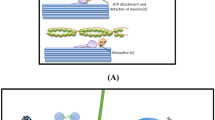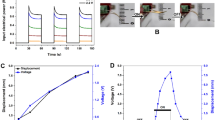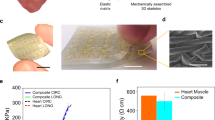Abstract
FOR several years it has been known that certain types of polymers, ‘chemical muscles’, change dimensions depending on their chemical environment1. A typical one is that prepared as a co-polymer of polyvinyl alcohol (PVA) and polyacrylic acid (PAA)2. This polymer swells or shrinks osmotically depending on the total ionic concentration inside the polymer. This is determined primarily by the degree of ionization of the weak carboxylic acid groups. When the external solution is acidic the degree of dissociation is low and the polymer shrinks. In alkaline solution it expands. This has been referred to as the ‘pH muscle’2.
This is a preview of subscription content, access via your institution
Access options
Subscribe to this journal
Receive 51 print issues and online access
$199.00 per year
only $3.90 per issue
Buy this article
- Purchase on Springer Link
- Instant access to full article PDF
Prices may be subject to local taxes which are calculated during checkout
Similar content being viewed by others
References
Kuhn, W., Hargitay, B., Katchalsky, A., and Eisenberg, H., Nature, 165, 525 (1950).
Kuhn, W., Ramel, A., and Walters, D. H., Size and Shape Changes of Contractile Polymers, edit. by Wasserman, A., 41 (Pergamon Press, New York, 1960).
Author information
Authors and Affiliations
Rights and permissions
About this article
Cite this article
HAMLEN, R., KENT, C. & SHAFER, S. Electrolytically Activated Contractile Polymer. Nature 206, 1149–1150 (1965). https://doi.org/10.1038/2061149b0
Issue Date:
DOI: https://doi.org/10.1038/2061149b0
This article is cited by
-
Design and Motion Analysis of a Bio-Inspired Soft Robotic Finger Based on Multi-Sectional Soft Reinforced Actuator
Journal of Intelligent & Robotic Systems (2022)
-
Biomedical soft robots: current status and perspective
Biomedical Engineering Letters (2020)
-
Hydrogel Walkers with Electro-Driven Motility for Cargo Transport
Scientific Reports (2015)
Comments
By submitting a comment you agree to abide by our Terms and Community Guidelines. If you find something abusive or that does not comply with our terms or guidelines please flag it as inappropriate.



